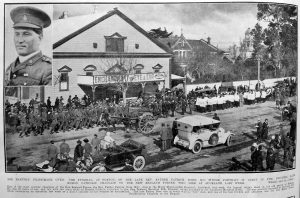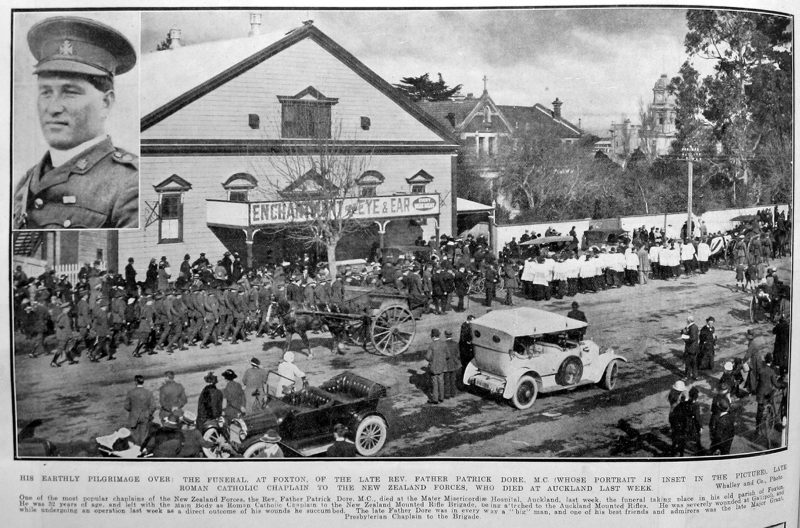by MICHAEL OTTO
With the centenary of the Gallipoli campaign this year, it seems fitting this Anzac Day for
this newspaper to look back at a “priest-hero” whose bravery under fire ultimately cost him his life.
 Patrick Dore was born in Ireland in 1885 and was ordained in 1910. He came to minister in
Patrick Dore was born in Ireland in 1885 and was ordained in 1910. He came to minister in
the archdiocese of Wellington and, as a curate in Palmerston North and parish priest of Kaikoura and Foxton, was greatly loved.

There was a large turnout for the funeral procession of military chaplain Fr Patrick Dore, MC, in Foxton in 1918, as shown in a publication of the time.
In August 1914, when the First World War broke out, Fr Dore volunteered as a chaplain.
He went away with the Mounted Rifle Brigade, which was attached to the Auckland Mounted Rifles.
Fr Dore arrived in Gallipoli two weeks after the original landing and he stayed until August, 1915.
According to secular media accounts, “Padre” Dore, as he was affectionately called by troops,
was remarkably popular.
One Gallipoli veteran later wrote that Fr Dore’s “unfailing cheerfulness and his rich Irish
humour were a constant source of inspiration to us”.
“He was in every way a ‘big man’, and one of his best friends and admirers was the late Major
Grant, Presbyterian chaplain to the brigade.
“His popularity may be gauged by the fact that Protestant soldiers have been known to tell their mates that if they should be killed, they would like to have the burial service conducted by him.” His popularity could also be put down to the fact that he often risked his life to bring in wounded men.
The same Gallipoli veteran quoted above said that if some soldier had to spend a night in
a “particularly unpleasant sap”, then Fr Dore was “almost sure to visit the post and give a word of cheer”.
But Padre Dore could occasionally get his dander up.
An account from an Auckland soldier reported in the Feilding Star in 1918 told of “one occasion when most of the New Zealand officers … had been out of action, Fr Dore, who was standing close by, picked up one of the rifles and went into action and fought fearlessly”.
“Some days afterwards, one of the men said to him ‘Father, why don’t you remain in the ranks and lead us?’
“‘No’, Fr Dore replied, ‘I cannot. My blood was up then, and I was an Irishman, but now I am
a priest.’”
It was while ministering to the wounded that Fr Dore suffered the injuries that would eventually end his life.
According to the book Bloody Gallipoli: The New Zealanders’ Story, Fr Dore had gone forward with a medical officer to tend to the wounded.
Another account states that he was attending to the wounded of another unit, which was
not his own.
Fr Dore was shot in the spine by Turkish fire.
He was initially saved by stretcher bearers, who carried him past basic medical sites to a better equipped facility. He nearly died from loss of blood.
Sent to England to recuperate from near paralysis, Fr Dore recovered sufficiently to travel back to New Zealand in 1916.
Fr Dore was awarded the Military Cross and he was also mentioned in despatches.
After treatment in Auckland, Rotorua, Wellington and also in Australia, he was able to return
briefly to his parish in Foxton.
But in 1918, he underwent an operation on his spine, which had become infected because of
his wounds.
Fr Dore died at the Mater Misericordiae Hospital in Auckland on July 15, 1918. His requiem
Mass at St Patrick’s Cathedral in Auckland was attended by many men who had been with him in
Egypt and Gallipoli.
Another war chaplain, Bishop Henry Cleary, presided.
The executive of the Returned Soldiers’ Association passed a resolution expressing deep regret
at Captain Dore’s death. “As Captain Dore’s sincere devotion to his duty and his sterling qualities are known so well to all returned soldiers, we feel as an association that we have lost a friend and a comrade.”
Fr Dore is interred in Foxton Cemetery.
He had a brother, Fr William Dore, who served as a priest in Auckland diocese and who died
in 1961.
A New Zealand Catholic Schools Journal item in 1932 states that the Roll of Honour for Gallipoli, “contains no name that is held in greater love and reverence than that of the late Chaplain-Captain Dore, MC”.
Last July, a Mass was celebrated at St Mary’s Church in Foxton coinciding with the centenary
of the start of World War I.
Tributes were made to Fr Dore and to another chaplain, Fr James Joseph McMenamin, who was killed in Belgium in 1917.
Fr McMenamin is buried in Nieppe in France.

God bless them.